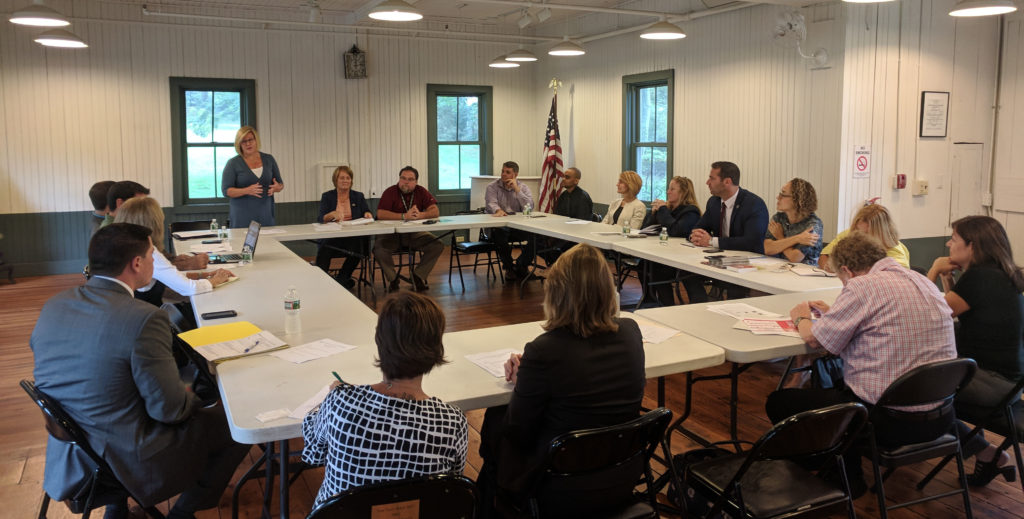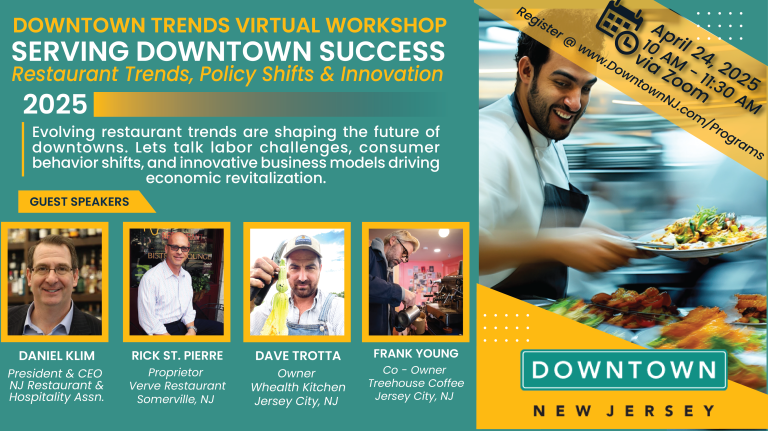Reducing Barriers to Economic Development
Courtenay D. Mercer, PP, AICP
Executive Director, Downtown New Jersey
September 14, 2018
More than 20 downtown managers, economic development directors and public officials gathered at round table discussion in Fanwood on September 12th to exchange ideas about hot topics in downtown economic development. Members of Downtown New Jersey were invited to join this quarterly meeting of Union County professionals and officials in what it hopes to be the first in a recurring series of “lunch & learn” round table exchanges.
The afternoon began with welcoming remarks from Fanwood Mayor, Colleen Mahr. “Development takes vision, patience and commitment to design projects that reflect the town’s character and fit easily into the downtown landscape,” said Mayor Mahr, who emphasized the importance of keeping the residents and business owners informed of plans from inception to completion.
Participants then introduced themselves and shared some recent success stories. From launching new branding and messaging campaigns, coordinating streetscape improvements, facilitating redevelopment negotiations, and organizing creative events – NJ’s downtown managers are busy people! The exchange allowed participants to hear about innovative ideas that could be useful in their own communities, as well as exchange ideas to navigate common (and uncommon) problems that arise in managing a downtown.
After the initial exchange, South Orange Village Center Alliance Executive Director and Downtown New Jersey Vice-President, Bob Zuckerman led a discussion about updating municipal ordinances to meet the evolving needs of modern businesses. Mr. Zuckerman explained that South Orange had lost several viable businesses because their ordinances were 30+ years old and did not accommodate many of the “experienced-based” uses so popular today. Accordingly, South Orange embarked on a three-year voyage to “scrub the code”, looking at both permitted use and design elements. More detail about South Orange’s process and results can be found in the recent article written by Mr. Zuckerman for the DNJ Quarterly Newsletter – Municipal Ordinances: Is Your Town Open for Business? . The discussion that followed Mr. Zuckerman’s presentation demonstrated that many municipalities are struggling with this issue. It also demonstrated that “one size does not fit all”, but at the same time gave participants an opportunity to talk through strategies that may work in their own communities.
The following is a brief synopsis of the considerations the round table participants thought were relevant in reviewing ordinances for business compatibility.
- Participants shared examples of specific uses not allowed in their towns currently or in the recent past – uses that are gaining popularity in the changing retail market; uses your community may want to research whether they are allowed in your own ordinance.
- “Sip & Paint” was excluded in some towns because places of “general assembly” were not allowed in the district. Participants also discussed varying degrees of difficulty getting this use approved due to health and liquor codes in their towns.
- Some codes are not flexible enough to allow temporary uses, such as “Pop-up Shops”, which are increasingly being seen as a good alternative to an empty storefront. One participant shared that they were encouraging and helping to organize home-based businesses to create cooperative Pop-up Shops in their town.
- Arcades, and “Barcades”, are also growing in popularity. Some towns outlaw both explicitly, while others prohibit games of entertainment where liquor is served.
- Tattoo parlors are another use that has evolved since days past. These establishments are cleaning up their aesthetic and becoming hip places to go. With nearly 40% of the US adult population having at least one tattoo, it might be time to reconsider the prohibition on this previously “undesirable” use.
- Another trend being driven by young adults is a desire for a diverse variety of live entertainment. Some towns do not allow live entertainment where food is served – often overlooked or not enforced in established restaurants/bars, but caused a problem for a new music venue trying to open in one town. The form of entertainment may also not comport with the community’s decency laws – as one town recently grappled with a burlesque show.
- Permitted uses may vary by the type of business corridor (e.g. primary “Main Street”, secondary street, side streets, etc.) and floor of the building (i.e. 1st floor vs. 2nd floor vs. upper floors). For example, do doctors offices and day cares belong on the main commercial corridor? Are they ok on the 2nd floor of a building in that corridor? The round table participants had a great deal of discussion about this topic. Some thoughts to consider on the location of uses:
- Size matters. Some spaces on the main commercial corridor may just not be big enough for a retail or restaurant use, but are fine for office. Limiting the size of office on the 1st floor may be a way to accommodate both the desire to keep the corridor lively, while also limiting the chance of vacancies.
- Some participants had success requiring service uses on the 1st floor to have a minimum percent of the space for retail. For example, the yoga studio could sell work out clothes and gear, the salon could sell beauty supplies, etc.
- Allowing conditional uses was discussed as another way to be more accommodating.
Ultimately, the decision is best made by the community – what works in one place might not be ideal for another.
Overall, the round table was incredibly informative and great forum for sharing ideas and experiences. If you are interested in hosting a future round table, please contact DNJ Executive Director, Courtenay Mercer, at info(at)downtownnj.com or (201) 472-0356.


